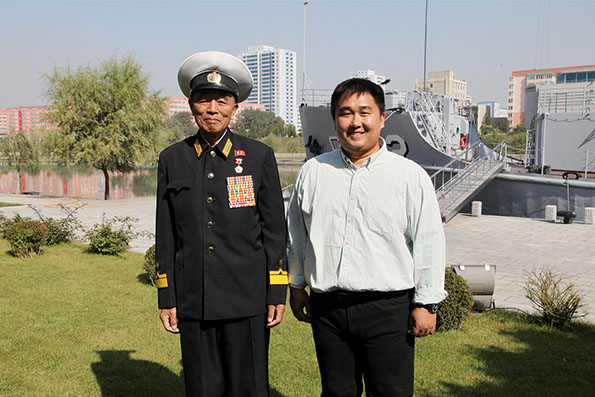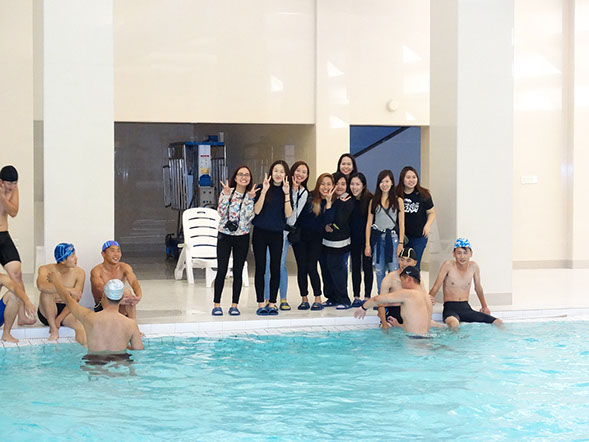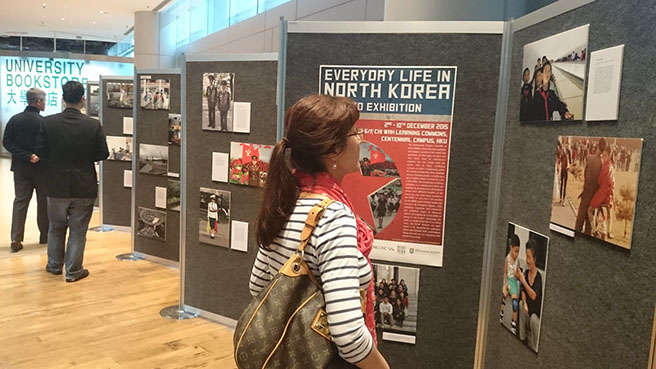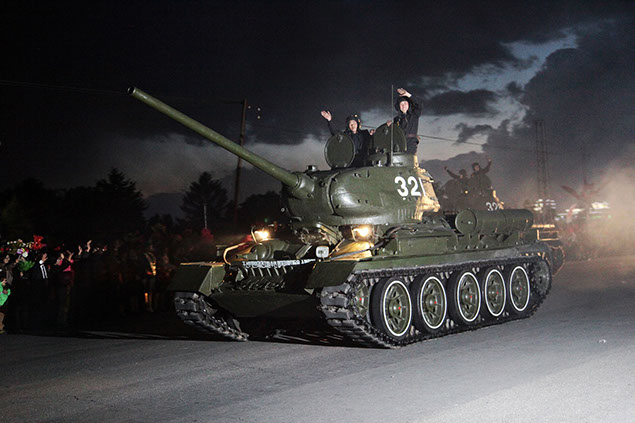
Winston Churchill once described Russia as ‘a riddle wrapped in a mystery inside an enigma’. The Democratic People’s Republic of Korea (DPRK) could be said to be the heir to that title, since self-imposed exile and conflicting accounts in the media and books make it very difficult to get a realistic picture of what daily life there is like.
Dr Victor Teo, Assistant Professor in the School of Modern Languages and Cultures, has been visiting North Korea since 2008 for his own research, and for the past two academic years he’s taken students there on field trips. “I noticed there is a disjuncture between what is written about the country and what is actually happening on the ground,” he said. “Consequently, when I started teaching a course on North Korea for the Korean Studies programme, I felt the students would benefit immensely from seeing first-hand what it is like to live in a truly un-free country.
“DPRK is like a living laboratory in that it is probably one of the remaining countries in the world where the Communist way of life is still very much preserved. I have travelled with elderly Chinese scholars who tell me that for them it is like travelling back to 1950s China. Anyone with an interest in Communism should pay a visit to this country.”
Hong Kong students are probably most surprised by how much North Koreans are similar to people anywhere in the world. “They have aspirations; they work and play hard and enjoy everyday life with family and friends, but without the rich material culture or opportunities people elsewhere have,” said Dr Teo. “They are intensely curious about the outside world and are very friendly, and are extremely proud of their country, their nation and their leader.
“One of the most important aspects of the students’ visits is for them to learn from their hosts as much as possible into daily life in DPRK. I ask them to learn about the way North Koreans perceive themselves, and their neighbouring countries, as well as the problems they face. This information is not easily available in books.”
The students are also introduced to how North Koreans see history and current affairs through study tours of the Museum of the Liberation of Motherland (The Korean War Museum) to give them insights into how the Korean War and the Cold War are explained from the North Korean perspective. But the trips also go beyond the usual tourist staple diet of monuments, memorials and museums. “We have taken students to shooting ranges, amusement parks, shopping centres, bowling alleys and libraries. Most of which are off the standard tourist itinerary,” said Dr Teo.
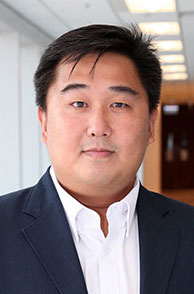
![]() The Democratic People’s Republic of Korea is like a living laboratory in that it is probably one of the remaining countries in
The Democratic People’s Republic of Korea is like a living laboratory in that it is probably one of the remaining countries in
the world where the Communist way of life
is still very much preserved. I have travelled with elderly Chinese scholars who tell me
that for them it is like travelling back to
1950s China. ![]()
Dr Victor Teo
Surprising sophistication
Asked for his own impressions, Dr Teo said he is constantly surprised by how sophisticated the North Koreans are in terms of coming up with solutions to deal with the difficulties they face, and how attuned they are to regional and global developments despite the façade they put up. “Every so often, people I encounter there, such as the officials, minders or guides appointed to accompany us, surprise me with very frank questions such as what do you think of our nuclear weapons programme? Why do you think the Americans are doing this or that? How do the Chinese feel about our sanctions?
“Also, in reply to a question I am constantly asked when I return from these trips: It would appear that the current leader does enjoy a lot of support from the people in Pyongyang, judging by the sense of optimism that the younger North Koreans have for the regime and the future of the DPRK. To put that into context, however, it is important to understand that the North Korean people do not have a lot outside references to compare him to. Those old enough can only compare the current leader to his father or grandfather.”
Dr Teo described an interesting occurrence which happened on a student trip in October, 2015. After six months of negotiations with governmental departments, the HKU group had been given permission to be in the main stadium in Pyongyang to watch a military parade alongside North Korean elites. However at the last minute they were told that for security reasons they had to watch the parade on the streets leading to the stadium alongside Pyongyang residents.
“While it was a disappointment not to be inside the stadium, it actually became a very interesting opportunity,” explained Dr Teo. “We spent about six hours in the crowd alongside ordinary North Koreans, who were not usually allowed to interact with us. It turned out to be the best six hours of our trip. And it got even more interesting when I learnt from sources in Pyongyang later why the switch had been made. We were there just after the October 2015 protest on campus at HKU and news of the protest had been transmitted to Pyongyang via DPRK’s Hong Kong consulate. The North Koreans were already wary of Hong Kong students because of the Umbrella Movement in the preceding year. The authorities then decided to move the HKU delegation for fear that students would engage in some sort of protests in the stadium!” Upon their return, the students and staff members organised two very successful public photo exhibitions on the DPRK which were attended by well over 2,500 people in total.
Next, a longer summer field trip in conjunction with students from Oxford, Cambridge and Harvard, as well as HKU, is being planned.Dr Teo is also negotiating a possible summer institute involving more in-depth visits to Kim Il Sung University or at Pyongyang University of Foreign Studies.
Lessons from the Land of the Un-free
Students are getting a first-hand glimpse into one of the world’s most mysterious countries, with regular field trips to North Korea.
Back
Dr Victor Teo (right) with Korea People’s Navy Commodore Kim Jin Cheol, one of the last surviving officers who was instrumental in the capture of United States spyship Pueblo in 1968. The USS Pueblo (background) was a research ship attached to US Naval intelligence and was seized by the North Koreans in 1968.
(Courtesy of CK Lee)
HKU students interacting with students of the Kim Il Sung University at the pool.
The photo exhibition on ‘Everyday Life in the DPRK’ held at HKU in December, 2015 attracted more than 1,500 visitors.
Students watching the military parade on the streets during one of the field trips to North Korea.
(Courtesy of CK Lee)
